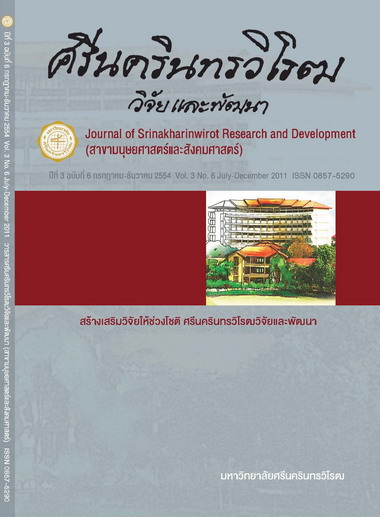ปัจจัยที่ส่งผลต่อความเหนียวแน่นในทีมและประสิทธิผลของทีมบริการการแพทย์ฉุกเฉินของโรงพยาบาลในเขตภาคกลาง (THE FACTORS AFFECTING THE TEAM COHESIVENESS AND THE EMERGENCY MEDICAL SERVICE TEAM EFFECTIVENESS IN THE MIDDLE OF THAILAND’ HISPITALS)
Keywords:
Team Effectiveness, Interpersonal Citizenship Behavior, Social Responsibility, Perceived Organizational support, team cohesivenessAbstract
บทมคัดย่อ การวิจัยครั้งนี้มีวัตถุประสงค์เพื่อค้นหาอิทธิพลของพฤติกรรมปฏิสัมพันธ์ทางสังคม ความรับผิดชอบต่อสังคม การรับรู้การสนับสนุนจากองค์การ และความเหนียวแน่นในทีมที่ส่งผลต่อประสิทธิผลของทีม กลุ่มตัวอย่างที่ใช้ในการวิจัย คือ ทีมบริการการแพทย์ฉุกเฉินของโรงพยาบาลในภาคกลาง จำนวน 146 ทีม การเก็บรวบรวมข้อมูลด้วยแบบสอบถาม แบ่งเป็น 3 ตอน คือ ข้อมูลเบื้องต้นของทีมและสมาชิกทีม ประสิทธิผลของทีมบริการการแพทย์ฉุกเฉิน และปัจจัยที่ส่งผลต่อประสิทธิผลของทีม วิเคราะห์ข้อมูลทางสถิติด้วยโปรแกรมสำเร็จรูป สถิติที่ใช้ ได้แก่ ค่าเฉลี่ย ส่วนเบี่ยงเบนมาตรฐาน ค่าสัมประสิทธิ์สหสัมพันธ์แบบเพียร์สัน การวิเคราะห์รูปแบบโครงสร้างความสัมพันธ์เชิงสาเหตุ
ผลการวิจัยพบว่า รูปแบบโครงสร้างความสัมพันธ์เชิงเหตุของประสิทธิผลของทีมมีความสอดคล้องกับข้อมูลเชิงประจักษ์ (x2 = 1.15, p-value = 0.28, GFI = 1.00, AGFI = 0.95, SRMR = 0.01, RMSEA = 0.03) พฤติกรรมปฏิสัมพันธ์ทางสังคมที่ดี ความรับผิดชอบต่อสังคม การรับรู้การสนับสนุนจากองค์การ และความเหนียวแน่นในทีมสามารถร่วมกันอธิบายความแปรปรวนของประสิทธิผลของทีมบริการการแพทย์ฉุกเฉินได้ร้อยละ 52 โดยความเหนียวแน่นในทีมส่งผลต่อประสิทธิผลของทีมมากที่สุด อิทธิพลทางตรงของพฤติกรรมปฏิสัมพันธ์ทางสังคม ความรับผิดชอบต่อสังคม และการรับรู้การสนับสนุนจากองค์การต่อความเหนียวแน่นในทีมมีขนาดอิทธิพลเท่ากับ 0.23, 0.30 และ 0.30 ตามลำดับ และพฤติกรรมปฏิสัมพันธ์ทางสังคม ความรับผิดชอบต่อสังคม และความเหนียวแน่นในทีมมีอิทธิพลทางตรงต่อประสิทธิผลของทีมด้วยขนาดอิทธิพลเท่ากับ 0.24, 0.22 และ 0.43 ตามลำดับ นอกจากนี้พฤติกรรมปฏิสัมพันธ์ทางสังคม ความรับผิดชอบต่อสังคม และการรับรู้ การสนับสนุนจากองค์การมีอิทธิพลทางอ้อมต่อประสิทธิผลของทีมผ่านความเหนียวแน่นในทีมด้วยขนาดอิทธิพล 0.08, 0.12 และ 0.10 ตามลำดับ
Abstract
The purpose of the study were to find influence among interpersonal citizenship behavior, social responsibility, perceived organizational support, team cohesiveness, and team effectiveness in Emergency Medical Service Team. Samples were 146 teams from Hospital’s Emergency Medical Service Team. The questionnaires used in collecting data were divided in to 3 parts: team and member data forms, team effectiveness in Emergency Medical Service Team, and factors affecting the team effectiveness. The data were analyzed by program for social-science research. The statistics analyzed were mean, S.D., Pearson’s product moment correlation, and path analysis.
The results were as following: the proposed model was modified to fit the data (x2 = 1.15, p-value = 0.28, GFI = 1.00, AGFI = 0.95, SRMR = 0.01, RMSEA = 0.03) interpersonal citizenship behavior, social responsibility, perceived organizational support, and team cohesiveness accounted for 52 percent of the variance in team effectiveness and team cohesiveness had the highest influence on the team effectiveness. The direct influence of interpersonal citizenship behavior, social responsibility, and perceived organizational support on the team effectiveness with 0.23, 0.30 and 0.30. Interpersonal citizenship behavior, social responsibility, and team cohesiveness had direct influence on the team effectiveness with 0.24, 0.22 and 0.43. And addition, interpersonal citizenship behavior, social responsibility, and perceived organizational support had indirect influence on the team effectiveness with 0.08, 0.12 and 0.10.
Downloads
Downloads
Published
How to Cite
Issue
Section
License
Srinakharinwirot Research and Development Journal of Humanities and Social Sciences is licensed Under a Creative Commons Attribution-NonCommercial-NoDerivs 4.0 International (CC-BY-NC-ND 4.0) License, Unless Otherwise Stated. Please Read Journal Policies Page for More Information on Open Access, Copyright and Permissions.



